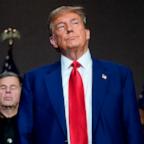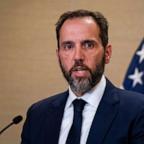The attorney general's office, in response to the defense's request for a directed verdict on the basis that the state failed to show that a bank or insurance company complained of fraud on the part of the Trump Organization, conceded that none of its witnesses were asked directly during the case whether they would have moved forward with a loan to the Trump Organization had they known about the fraudulent valuations alleged by the New York AG.
"Did any bank employee say, 'We would have done it different,' and if so who?" Judge Engoron asked the state attorneys.
"Mr. Haigh said that in his deposition," state attorney Kevin Wallace responded, referring to Nicholas Haigh of Deutsche Bank -- though Wallace acknowledged Haigh was not asked that during his direct examination.
Defense attorney Christopher Kise, in his argument for a directed verdict, said the state failed to present any evidence that a bank or insurance company would have dealt with the Trump Organization differently.
"There's no, even theoretical, argument that the approvals, rates or terms would have been different," Kise said. "Ultimately what matters is the decision-making process of the bank. If they would have approved it with this knowledge, then it's not material."
Kise also argued that the inclusion of the so-called "worthless" disclaimer in Trump's statements of financial condition -- which warned lenders that the valuations in the document required judgment and that they should do their own analysis -- prove that Trump had no intent to defraud.
That prompted Engoron to interject.
"You seem to be saying the fact that someone says 'Don't believe me' proves that they are not lying," Engoron said.




